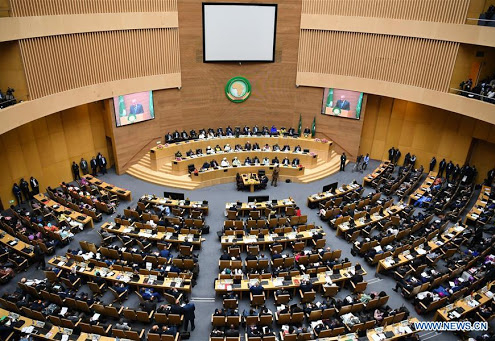Membership
Member states of the African Union
All UN member states based in Africa and on African waters are members of the AU, as is the disputed Sahrawi Arab Democratic Republic (SADR). Morocco, which claims sovereignty over the SADR’s territory, withdrew from the Organisation of African Unity, the AU’s predecessor, in 1984 due to the admission of the SADR as a member. However, on 30 January 2017, the AU admitted Morocco as a member state.[31]
Members
Algeria
Angola
Benin
Botswana
Burkina Faso
Burundi
Cameroon
Cape Verde
Central African Republic
Chad
Comoros
Democratic Republic of the Congo
Djibouti
Egypt
Equatorial Guinea
Eritrea
Eswatini
Ethiopia
Gabon
Gambia
Ghana
Guinea
Guinea-Bissau
Ivory Coast
Kenya
Lesotho
Liberia
Libya
Madagascar
Malawi
Mali
Mauritania
Mauritius
Morocco
Mozambique
Namibia
Niger
Nigeria
Republic of the Congo
Rwanda
Sahrawi Arab Democratic Republic
São Tomé and Príncipe
Senegal
Seychelles
Sierra Leone
Somalia
South Africa
South Sudan
Sudan
Tanzania
Togo
Tunisia
Uganda
Zambia
Zimbabwe
Regions of the African Union:
Northern Region (Sahara) , Southern Region (Kalahari) , Eastern Region (Nile) , Western Regions A and B (Niger and Volta Niger) , Central Region (Congo)
Governance
The principal topic for debate at the July 2007 AU summit held in Accra, Ghana, was the creation of a Union Government,[32] with the aim of moving towards a United States of Africa. A study on the Union Government was adopted in late 2006 and proposes various options for “completing” the African Union project.
There are divisions among African states on the proposals, with some (notably Libya) following a maximalist view leading to a common government with an AU army; and others (especially the southern African states) supporting rather a strengthening of the existing structures, with some reforms to deal with administrative and political challenges in making the AU Commission and other bodies truly effective.
Following a heated debate in Accra, the Assembly of Heads of State and Government agreed in the form of a declaration to review the state of affairs of the AU with a view to determining its readiness towards a Union Government.[35] In particular, the Assembly agreed to:
- Accelerate the economic and political integration of the African continent, including the formation of a Union Government of Africa;
- Conduct an audit of the institutions and organs of the AU; review the relationship between the AU and the RECs; find ways to strengthen the AU and elaborate a timeframe to establish a Union Government of Africa.
The declaration lastly noted the “importance of involving the African peoples, including Africans in the Diaspora, in the processes leading to the formation of the Union Government.”
Following this decision, a panel of eminent persons was set up to conduct the “audit review”. The review team began its work on 1 September 2007. The review was presented to the Assembly of Heads of State and Government at the January 2008 summit in Addis Ababa. No final decision was taken on the recommendations, however, and a committee of ten heads of state was appointed to consider the review and report back to the July 2008 summit to be held in Egypt.[36] At the July 2008 summit, a decision was once again deferred, for a “final” debate at the January 2009 summit to be held in Addis Ababa.

